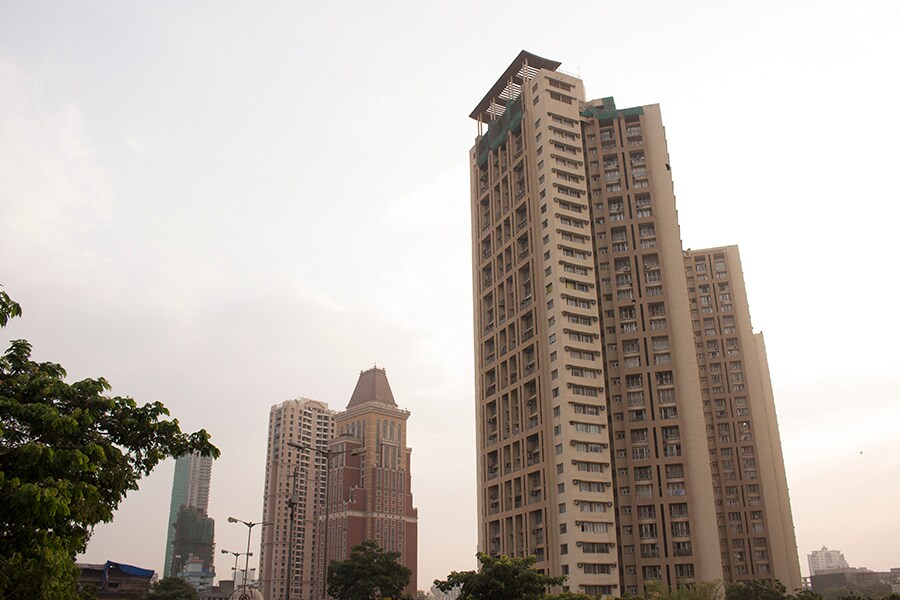
Re-rating the realty stocks after Indiabulls' intra-day surge
Low interest rates and bottoming of prices could be a turning point for the residential segment
 Image: Joshua Navalkar
Image: Joshua Navalkar
On April 17, the shares of Indiabulls Real Estate (IBRE) went up by 40 percent in a single day, mainly following news that the company’s board was eyeing a demerger of its business segments.
IBRE operates in both the residential and commercial segments of the real estate business and there is a proposal to separate the commercial and leasing business from the residential business. The board plans to hive off the commercial business into Indiabulls Commercial Assets Ltd (ICAL), which will be listed on the stock exchanges on a later date.
Over the last five years while the BSE 500 index doubled, IBRE’s share price moved up by a mere 45 percent. Then on April 17, the stock caught up with the BSE 500’s returns with a single day’s surge. But most of the marquee investors owning the stock had already exited by then and very few could benefit from the ‘single day return’ of 40 percent. The stock currently trades at Rs 143 apiece and has a market capitalisation of Rs 7,268 crore.
For the nine month period ended December 31, 2016, IBRE clocked revenues of Rs 1,883.3 crore and a net profit of Rs 294 crore. The market likes the fact that the company is separating the commercial and the residential businesses as both these segments have different growth dynamics. Industry statistics show that it is the commercial business that has done well over 2016.
According to JLL India, a real estate consultancy firm, the office vacancy numbers were at a low of 15 percent in the last eight years showing an emergence of commercial activity on the back of strong demand from the IT sector in Bengaluru, Pune and Hyderabad. In 2013, office vacancy was at 18.5 percent. The number is expected to fall further in 2018 due to scarce availability of office space. This will help companies in the commercial real estate business.
While the demand for office space is increasing, the same cannot be said about the residential space. In the top four cities, residential demand is down and so is the supply. And that is the reason why a lot of contrarian investors are ready to change their minds. They feel that falling interest rates and bottoming of real estate prices for the residential housing segment is a very good turning point as interest rates on home loans have come down to around 9 percent.
“It means that demand should pick up from here. But the problem is most of the balance-sheets are difficult to understand. We like the sector but prefer to play it through housing finance companies which are growing at a much faster rate than the real estate sector itself,” says a fund manager.
The housing finance companies, especially the new ones are growing at a rate of around 50 percent per annum but are fully valued by the stock market. Companies like Motilal Oswal Financial Services (MOFS) and IIFL, who are new to the housing finance business, have doubled their stock prices over the last two years.
The bigger companies like HDFC and HDIL are also growing at around 10-15 percent per annum. But there is a huge divergence between the housing finance sector and the real estate sector that they finance. Sample this: The real estate sector as represented in the BSE 500 has a market capitalisation of Rs 1 lakh crore and HDFC, the biggest private sector housing finance company, alone has a market capitalisation of Rs 2.39 lakh crore.
A big reason for the divergence is because of the fact that much of the real estate sector is fragmented and is not represented in the BSE 500. Those that are listed are in the top tier towns where the supply is high. Most of these companies are debt laden and have primarily operated in the middle income market where growth rate is now stagnated and prices are very high. The real growth is in tier II and tier III towns where there is hardly any presence of listed real estate companies.
It is the cost of land in top cities that becomes a major element that puts a dent in the profits of real estate companies. “If you want to really play this sector, then it is better to buy the paint sector which is known for its growth and management. But then valuations are really high in this sector. Affordable housing sector has some well managed companies and we might see some rerating of this sector,” says Neelesh Surana, Chief Investment Officer at Mirae Asset Mutual Fund.
The Real Estate Regulation & Development Act (RERA) is going to be the real game changer in the real estate business. “This landmark law will enforce hitherto unprecedented transparency and accountability requirements for developers into the system, and do a lot to increase consumer confidence. Consumer activism, which has already been making news in recent times, will increase in distressed ongoing projects,” says a JLL note.




